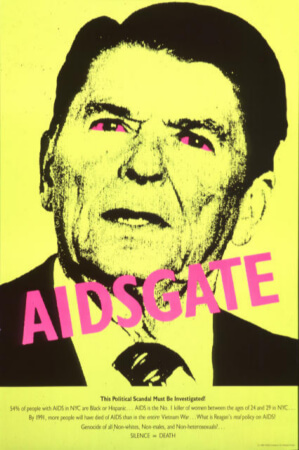BY KELLY COGSWELL | I've got no new tactics to fighting HIV/ AIDS, but I know we have to look for them. Some of the things we'd assumed are just plain wrong. Like successful treatment programs would lead to a lessening of stigma. Well, I've heard from a friend in Burundi that the reverse is true. Before, HIV-positive people had to become activists to save their own lives and often found courage they never knew they had. They spoke out and changed people's attitudes. Now, with the new drugs, the newly diagnosed cower and run, and the drugs help them to. There are fewer activists, not more. And more silence.
In the US, too, activists are flailing even as infection rates are increasing, along with blasé attitudes. Many queers actually seem hostile to the idea that young LGBT people should be warned about HIV/ AIDS. That possibility hadn't crossed my mind until last week when I checked out the responses to Michael Specter's grief-stricken article in the New Yorker, “What Young Gay Men Don't Know About AIDS.”
In the threads, a significant amount of commenters, many of them gay, condemned Specter for his “scare tactics,” his “labeling” and “stigmatizing.” According to them, HIV/ AIDS is a manageable disease just like diabetes, and old fogies like Specter should get over themselves. Things have changed. It was homophobic to keep pointing out that queers were getting the disease when straights were, too. A virus knows no gender, no sexual identity. It was racist to mention young black men were hardest hit.
While there are still plenty of people getting HIV because they don't know how to prevent it and I know there is a trend of young queers of color who don't protect themselves because they figure “what the hell, I'm doomed, I'll get it anyway,” these commenters seem to belong to a different category.
With and without HIV, gay and straight, they seem somehow… smug. They are part of the growing — and not just right-wing — trend of people who hate activists on principle. They are profoundly lazy, both physically and morally, invested in declaring HIV/AIDS “manageable” because that means they won't have to worry about condoms. Or responsibility. If they get HIV and pass it on, it's no big deal. They haven't ruined anybody's life or caused anybody's death. These commenters even blame gay AIDS activists for the disease's stigma — not homophobic bigots.
I can't imagine where to start with them. I suppose we could try to dispel the notion that any disease can be benign. I go especially nuts when they compare HIV/AIDS to diabetes, a real disaster of a “manageable” disease that runs in my family. You have to watch what you eat all the time, exercise, take your meds, test your blood sugar. Struggle to forgo sweet tea, potato chips. All the good stuff. Get it wrong, you're screwed.
It messes up your circulation and any little cut or bruise can be dangerous. A friend of mine lost half his foot. My aunt lost both her legs before she lost her life. You should have seen her in the hospital — half the bed empty where her legs used to be, all the tubes snaking in and out. People go blind. Stroke out. It's the seventh leading cause of death in the United States, this manageable disease.
HIV is no better. Drugs don't work for everybody. Sometimes they have side effects. You have to remember to take them, and have insurance to pay for them. Even if your viral load drops, you have to get tested all the time because it might go up again. You worry with every cold, every flu. It's not like in the ads where a handsome guy takes a single pill and gets happily on with his life. It is so much better and easier to just wear a fucking condom. If you forget once or twice and get stuck with HIV. Well, cross that bridge when you come to it. But avoid that bridge. Burn it. Run away as fast as you can go. Flee for your life.
Also, you should know, HIV may cause more than just AIDS with its pneumonias and sarcomas. Up until last year I had a brother-in-law, Carlos. Decent guy. HIV-positive. He hadn't needed meds for years. One day, he went to his doctor for a bad back and the doctor found these lumps. It turned out to be a kind of lymphoma that wasn't exactly AIDS-related but tends to appear in people with HIV, though very rarely in the general population. There was a bunch of chemo. It went away. Came back.
But you don't want to hear about that. HIV is manageable. No big deal. No weird cancers popping up. Nothing percolating. You have no role in its spread.
Kelly Cogswell’s book “Eating Fire: My Life as a Lesbian Avenger” is due for publication in March from the University of Minnesota Press and can be pre-ordered via Amazon.


































